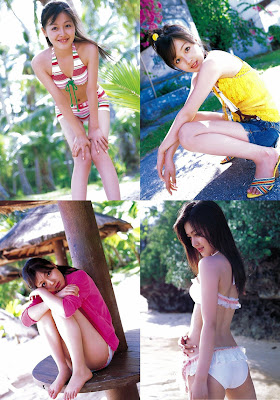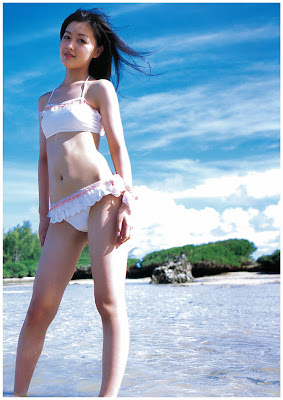
People often refer to a fondly remembered era of a certain pastime as "the Golden Age of _____." You can fill in the blank with "Radio," "Television," "Hollywood," "Baseball," etc. So naturally folks who collect old comic books sometimes talk about the Golden Age of Comics. But those collectors have also developed a tradition of using terms like "Silver Age" and "Bronze Age" to differentiate between the various eras of American comic history. There is even a Platinum Age, which refers to the period leading up to the Golden Age.
Now, whether or not it makes sense to use this kind of terminology to describe comic book history is debatable. Certainly there is no end to the squabbling about exactly how those ages should be defined.
Nevertheless, since the idea of a Momusu "Golden Era" is often invoked, I thought it might be fun to break down the entire MM history into comic-style ages. In light of the upcoming ALL SINGLES COMPLETE ~10th ANNIVERSARY~ release, the time is ripe to review MM history in such a way, specifically focusing on the singles.
Please note: this is just for fun and not to be taken too seriously.
Platinum Age (1997-1999)
00 Ai no Tane
01 Morning Coffee
02 Summer Night Town
03 Daite HOLD ON ME!
04 Memory Seishun no Hikari
05 Manatsu no Kousen
06 Furusato
OK, this one's easy. Everyone knows that the Golden Era began with
LOVE Machine, so let's say the preceding singles make up the Platinum Age. Stylistically, this era clearly stands apart from the others, though the disco grooves of
Summer Night Town and
Daite HOLD ON ME! would carry over into megahits like
LM and
RR21.
While
LOVE Machine was a true phenomenon, the group was already very popular during the early days; no one could complain about their sales during this period, especially compared to the lean times of today. This era is also notable for Nacchi's emergence as a front girl and a star in her own right. Even though her solo career has been rather modest, I always think of Nacchi as the Queen of H!P.
 Golden Age
Golden Age (1999-2002)
07 LOVE Machine
08 Koi no Dance Site
09 Happy Summer Wedding
10 I WISH
11 Renai Revolution 21
12 The Peace!
13 Mr. Moonlight ~Ai no Big Band~
14 Souda! We're ALIVE
15 Do it! Now
The Golden Age was heralded not only by the addition of Gocchin to the ranks, but also by the arrival of the arranger known as Dance*Man. Dance*Man brought a buoyant, fun and funky edge to Tsunku's compositions, and definitely enhanced the commercial appeal of the Momusu singles he arranged. But while it seemed like a partnership made in heaven, Tsunku and Dance*Man eventually had a falling out, perhaps due to those darned inevitable "creative differences." Dance*Man would depart after
Souda!, never to return.
After the next single (
Do it! Now) Gocchin would graduate. This makes a tidy endpoint for the Golden Age, in my estimation.
 Silver Age
Silver Age (2002-2004)
16 Koko ni Iruzee!
17 Morning Musume no Hyokkori Hyoutanjima
18 AS FOR ONE DAY
19 Shabondama
20 Go Girl ~Koi no Victory~
21 Ai Araba IT'S ALL RIGHT
22 Roman ~MY DEAR BOY~
23 Joshi Kashimashi Monogatari
To me, the transition to the Silver Age is marked by a decline in sales, but not necessarily in quality. There
is something timeless about the best Golden Age songs, but many of these Silver Age songs are every bit as fun and even more exuberant, in some cases.
The addition of Sixth Gen during this era swelled Momusu's ranks to an incredible 15 members. Which led to the creation of the subgroups, or
gumi, Otomegumi and Sakuragumi; you could reasonably add their singles to this list as well.
I've capped off this era with
Joshi Kashimashi Monogatari, the last single for the "Top Two," who would graduate to concentrate on their unit
W for an all-too-brief time.
 Bronze Age
Bronze Age (2004-2007)
24 Namida ga Tomaranai Houkago
25 The Manpower!!!
26 Osaka Koi no Uta
27 Iroppoi Jirettai
28 Chokkan 2 ~Nogashita Sakana wa Ookiizo!~
29 SEXY BOY ~Soyokaze ni Yorisotte~
30 Ambitious! Yashinteki de Ii Jan
31 Aruiteru
32 Egao YES Nude
33 Kanashimi Twilight
The first few singles of this era mark a transitional period as Kaori, Rika and Mari take their leave, while the "Miracle" Koharu joins with
Iroppoi Jirettai. But Koharu wasn't exactly the ace that some were expecting and by the time
SEXY BOY was released sales would dip below 50k for the first time in, well, ever.
Compared to the wildly creative Golden Age, songs from the Bronze Age sometimes seem a little too straightforward and with declining budgets the videos can tend toward the plainer side. Not that the songs are bad at all, some of them are great. And the video for
Kanashimi Twilight, for instance, is minimalist but very effective.
Despite all the doom-saying in fandom, any rumors of Morning Musume's demise have been greatly exaggerated. They scored a number one hit with
Aruiteru, and
Kanashimi Twilight's sales broke the 60k mark. But
KT would be the last single for high profile members Yossie and Miki.
 Panda Age
Panda Age (2007-)
34 Onna ni Sachi Are
Obviously, the title for this age is a bit tongue-in-cheek. ; )
Take out Yossie and Miki, add Eighth Gen and we have Morning Musume: The Next Generation. There's something so fresh about this group -- even though it seems to be lacking in powerhouse members, this may be my favorite lineup of the last couple of years.
Aika has been slightly overshadowed by the Chinese members, but I think she's developing beautifully. Jun Jun and Lin Lin are a hoot, and I look forward to following their wide-eyed adventures in a brave new j-pop world. I love the Ai/Risa leadership, Koharu is starting to display the star qualities that Tsunku saw in her, and Sixth Gen is never less than absolutely adorable.
**********
So what does the future hold for Momusu? Is a new Golden Age on the horizon?
Well, probably not. It's hard to visualize them capturing the imagination of the public again in the same way
LOVE Machine did. Girl idols are a niche market, for now. But trends go in cycles, so you never know. And who can say where this Asian Invasion will lead?
Come what may, here's to the next ten years!
.

















